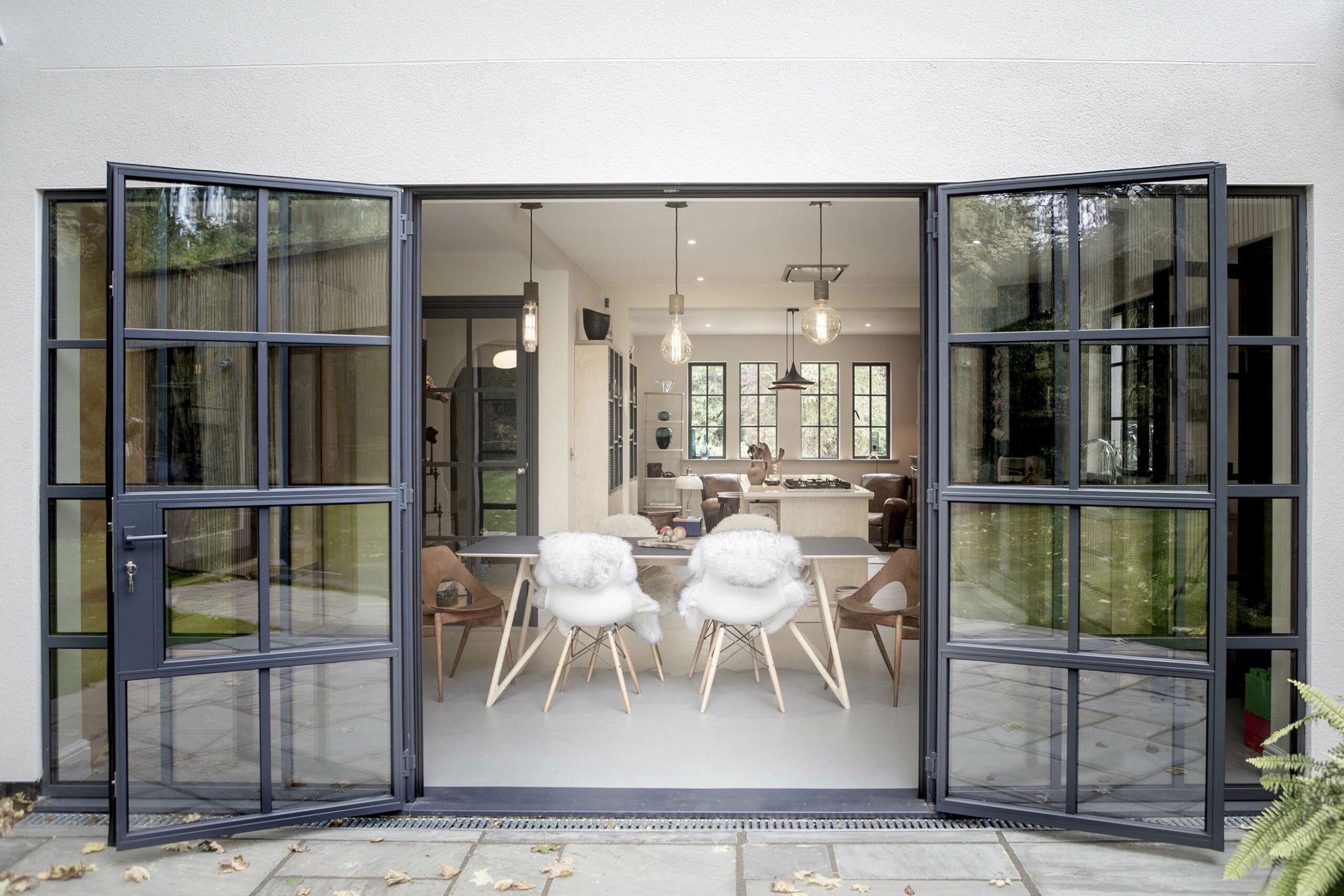
Do you need building insurance for a renovation project?
Are you planning a renovation project for your home? And if so, what arrangements have you made regarding insurance cover? As leading renovation architects specialising in high-end contemporary build and extensions, and sympathetic renovations to period properties across London, Surrey, Oxfordshire, Buckinghamshire and Berkshire, we’re often asked about building insurance for renovation projects.
According to one survey, 64% of UK homeowners didn’t check their insurance policy before renovating their property, and 55% omitted to tell their insurer when they carried out structural work. With a potential national bill of £2.77bn, this is a very expensive oversight.
But just how much do you need to tell your insurance company? And what kind of cover should you have when carrying out building works?
To help ensure your home is adequately protected, we asked our go-to expert, Jenny Carter-Vaughn from Affinity Select Insurance Services, to explain how insurance cover works during renovations, and the mistakes you need to avoid.
How much insurance cover do you need for a renovation project?
To insure a building renovation project properly, you need to budget between 1-5% of the project value, depending on the nature of the works and the build cost This may seem expensive when compared to standard household or property owner’s insurance, but when you consider what your insurance is covering, it makes sense.
When you buy home insurance you’re insuring what is effectively a watertight box with locks and other defences against the weather and burglary. However, when you insure a building project you’re insuring a building site.
This means you’ll be disabling your locks and other protection devices during the build (as well as advertising to any passersby that your property is no longer secure). You’ll be taking delivery of building materials and equipment which thieves may find attractive. And you’ll be exposing your property to the weather – without a roof or windows your property is vulnerable to loss or damage from wind, rain, storms and flooding.
Can you extend your home insurance to cover your renovations?
Most people planning a building project understandably ask their existing home insurers to cover their property during the renovations. However, in many cases they’ll discover that not only can they not extend their cover, but that their insurance company will refuse to cover their property at all during the building work.
And while it may not seem like it initially, if your insurer or broker does tell you that you are not covered during renovations you should consider yourself lucky. Why? Because some insurers will confirm that your policy continues to cover the property, but fail to mention that your cover is very restricted.
In most cases your home insurance policy would be reduced to cover only damage caused by fire, explosion and aircraft impact during building work. However, this won’t usually be explained by your advisor, leaving you under the impression you’re protected – until you need to make a claim. Only then will you discover the restrictions in the policy wording.
In reality, the most likely cause of damage to your home during repairs and renovations is theft or weather damage, neither of which are usually covered by your existing policy. This is why it’s so important to buy proper renovation insurance.


What does renovation insurance cover?
A renovation insurance policy will cover your existing structure, the new work and your property owner’s liability during the building project.
But that’s not the only insurance you need to check is in place. You also need to make sure that your builder has public and employers’ liability insurance, and that any experts that you use (such as architects or surveyors) all have appropriate professional indemnity insurance. This should be maintained for 12 years after your build is completed.
Why you can’t rely on your builder’s insurance during renovations
Many homeowners assume they can rely on their builder’s insurance for their building works. But this is a risky strategy, because you don’t own the policy.
Why is this important? In an ideal world, your builder will complete your project on time and to a high standard and you’ll part as friends. Unfortunately, however, this isn’t always the case. Projects go wrong. People fall out with their builders. And sometimes builders go out of business.
And if the insurance policy for your building works belongs to your builder, then you as the project owner are exposed to the possibility of being uninsured.
So if you have a dispute with your builder (or they go out of business) and they leave the project, the partially completed work you have paid for will be uninsured. Even if you find a new builder to finish the work, they will only cover their work – not work that has already been carried out.
You’ll then find yourself stuck in a situation where part of the work (which you may have paid many thousands of pounds for) is uninsured until the whole project is completed.
You don’t even need to fall out with your builder to find yourself facing this scenario. It also applies if you change contractors part way through the build, or use different contractors for different parts of it.
The reason for this is because each builder’s insurance only covers their work while they are actively engaged in the project. So, if you employ one contractor for the groundwork, one for the structure and another for the roofing, any work that has been completed will be uninsured until the project has been finally completed – and you can then insure your property with your domestic insurance policy again.
Another important point to remember is that if your builder forgets to pay (or cancels) their insurance premium without telling you, you won’t be covered. Nor will you be covered if your builder has provided their insurance company with incorrect information when taking out their policy.
In short, if you want to have any control or certainty over your home’s insurance cover during a renovation project, don’t rely on your builder’s policy – get your own.
Taking out your own insurance gives you greater peace of mind
By taking out your own insurance cover for your renovation project (covering both your property and the building works) you also simplify any claims. If there is any damage, for example an electrical fault that leads to a fire, there will be no dispute over which policy picks up the cost of the damage because both the project and the property are insured by one insurer under one policy.
You also maintain control over how any claim is handled and who receives any payout. If you chose to rely on your builder’s insurance, they decide whether or not to make a claim, and how to handle that claim. And if your builder goes into liquidation, any claim payment would be paid to their administrators – not to you – and be used to repay creditors. Even if you are lucky enough to receive any of the money, it will take months to resolve.

How much will building project insurance cost?
Building project insurance is rated on the length of time that your project will take, the rebuilding value of the existing structure, and the cost of the works.
Insurers will also want to know what type of work will take place, and whether there will be any underpinning or strengthening of existing foundations. They’ll also ask about any additional structural support that will be incorporated into the build (for example where walls are removed and RSJ/ steel beam supports are inserted).
If you are removing the roof, replacing windows or doors, knocking down external walls or using scaffolding, you need to tell your insurer. You also need to notify them of previous subsidence or history of flooding, and any trees close to the property.
It’s a good idea to share plans and provide details of the planning office and reference number, so insurers can check out the exact plans if they wish.
Do you need non-negligence insurance?
If your property is attached to another property or there are other properties close by, you should consider buying non-negligence insurance (sometimes called party wall insurance).
Non-negligence insurance covers you against any damage to your own or surrounding properties, which was not considered likely by your architects, building engineers or builder, but occurs during the course of, or as a result of, carrying out your building work.
This can include, as an example, damage that results from vibration during your works that weakens or leads to the collapse of your next-door neighbour’s ceiling. Non-negligence insurance is particularly important if you want to dig out a basement or are doing works that are very close to another property.
What kind of insurance contract do you need?
A JCT insurance contract is a good way to set out your agreement with your builder. If you are using a minor works contract, then you can use class 5.4b (unless your existing structure is unsafe or an ancient monument).
You may also want to consider construction guarantee insurance. This covers the structure and work that has been done, normally for a period of between five and ten years. Similar to a new home NHBC warranty, construction guarantees provide a wide protection after the works are completed.
This mean that if, for example, your builder cuts corners and pins together the frame of your new home using 9mm bolts instead of 10mm, and the structure twists out of shape and becomes unstable a year after the build, you have a policy that will pay to rectify the problem if your builder goes into liquidation and can’t put the damage right.
Construction guarantees can be arranged on a variety of different parts of a build, from foundations, roofs and basements, to complete new builds. The extent of cover will depend on the work elements insured. You’ll normally need inspections from the insurers’ engineers, and this can replace building control inspections if carried out during the build.
It’s always wiser to organise your construction guarantee before the build begins, as it’s much cheaper to arrange for surveys to take place during the build than after. Often if you need to raise a mortgage or loan or are selling the property a lender will require a construction guarantee to be in place for at least ten years after completion.
Make sure your renovation project (and home) is properly covered
There’s a lot to plan and pay for when undertaking a large renovation project on your home. But as you are now aware, it’s important to make sure that your building works are properly covered. Investing in the right insurance now can save you many hours of worry and considerable cost, if anything goes wrong.
What’s next?
As a leading renovation architect in London, Oxfordshire and the South West, find inspiration for your renovation project.
Find out more about how we work or get in touch for an initial chat about your project.